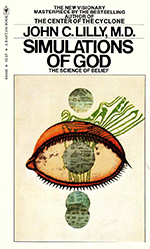Simulations of God: The Science of Belief

Simulations of God: The Science of Belief
by John Lilly, M.D.
Simon and Schuster, 1975, $8.95
Reviewed by Robert Anton Wilson
When the New York Times described Dr. John Lilly as “a walking one-man syllabus of Western civilization,” they were hardly exaggerating. A man who has worked extensively in medicine, neuroanatomy, psychoanalysis, delphinology, cybernetics, LSD research and such recent scientific adaptations of traditional mystic arts as the Gurdjieff and Arica consciousness-expanding systems, Dr. Lilly is one of the few people alive who actually know enough to have an intelligent opinion about the situation of planet earth in the year 1976.
Those whose nervous systems stopped growing in 1966, or 1956, or 1946, or earlier, will be somewhat aghast to find Dr. Lilly cheerfully announcing on page 2 that he spends much of his time these days outside his body, in an extra-terrestrial civilization, where he is “expanded beyond all human imaginings.” He also spends a lot of time in “the future of humankind (Circa A.D. 3001).” If all this sounds suspiciously like the recent writings of He Who Is Not To Be Named (the Arch-Heretic in the federal dungeons), it also sounds like the dingbats who write the “True Experiences” in pulp flying saucer magazines.
But Dr. Lilly is no dingbat and Simulations of God shows the some keen scientific intelligence as his earlier books. Eventually, if we are not irrevocably wed to our old ideas of space and time, we must ask—as Tom Wolfe asked of McLuhan—but what if he’s right? Is it possible that disciplined work on rewiring the nervous system with LSD, sensory deprivation, and traditions derived from Sufism can actually make one a receptor for higher intelligences elsewhere in space-time?
This is not an isolated heresy of Dr. Lilly (and The Nameless One in federal custody). The neurologist, inventor and manufacturer, Dr. Andrei Pujarich, after exhaustive study of the Geller case, has concluded that the only rational explanation is that Geller is another such receptor of higher intelligences, which he thinks of as extra-terrestrial. A prominent Bay Area physicist, who has asked me not to use his name, also believes in higher intelligences behind Geller, but thinks they are time-traveling physicists from the earth’s future.
Even R. Buckminster Fuller has been touched by this new heresy, and in his recent book, Intuition, suggests that he himself has often received ESP transmissions from mom advanced intellects somewhere else in the space-time continuum.
This is obviously going to become one of the most hotly debated scientific issues of the next decade, and Dr. Lilly deserves praise and encouragement for being one of the first to speak out on the matter. Probably several dozen—or several hundred—others, in various sciences, have had the same experiences, but refuse to discuss them openly for fear of ridicule, loss of status, or even more serious consequences. (As long as You Know Who remains caged, there is an implicit warning to all other scientists not to spook the herd with too-radical speculations.)
Simulations of God, actually, is three books in one. There are, running through the text, various unearthly and transhuman perspectives on events, derived from Lilly’s “allies” (as Don Juan would call them) in other space-time dimensions. There is also an exhaustive listing and evaluation of all the models, or analogs, of “God” thus far invented by humanity. God as Righteous Wrath, God as Compassion, God as Him or Her Out There, God as Computer. Like Gopi Krishna, Lilly finds all of these models woefully inadequate and detects human chauvinism and pomposity in the very notion that we, at or present stage of evolution, can begin to utter meaningful propositions about any Intelligence high enough to qualify as a “God.”
The third book is a series of appendices containing earlier writings (never before collected in book form) on the technical details of such consciousness-expanding methods as sensory deprivation, drugs and the Arica system. My favorite paragraph in the whole book is the one most likely to infuriate the average seeker for mystical insight and dogmatic revelation: “The ‘Yoga of the West’ is divided into the ‘Mathematical Yoga’ and the ‘Experimental Science Yoga.’ Each of these requires just as much discipline, mastery of self, and ability of inner and outer actions as anything imported from India, China or Japan. In my teaching experience, teaching science of the West and teaching techniques from the East, I find that those who need the least teaching, i.e. who already have the self-discipline necessary to master any of these techniques, are those in the West who are trained in mathematics and/or science.”
This may have an element of polemical exaggeration in it, but it is far truer than the popular notion that those who have always been too lazy or too conceited to learn the humility and patience of scientific-mathematical method can leap into Hatha Yoga or Zen and obtain marvelous results immediately. The plain fact is that most people (emphatically including most non-scientific “intellectuals”) are so smugly satisfied with the notions that were conditioned into them before their nervous systems stopped growing in mid-adolescence that they haven’t the incentive to learn anything new, either from the Yoga of the West or the science of the East. The average anti-science fop, actually, can’t take more than a few days of the rigorous sciences of Hatha Yoga or Zen and quickly retreats to something fit for his/her paleolithic mental level—e.g., Krishna chanting, Jesus freakery, Scientology or some similar zombiehood.
Incidentally, Dr. Lilly has some unkind (or condescending) things to say about one of my contributions to yogic-science, on page 87. That is his privilege and I see no reason to quarrel with him about the matter. I hope the longevity pill arrives soon enough to preserve him to write a thousand books as provocative and luminously brilliant as Simulations of God.

Simulations of God: The Science of Belief
reviewed by Robert Anton Wilson appeared in Gnostica, Volume 5, Number 2 (1976).

